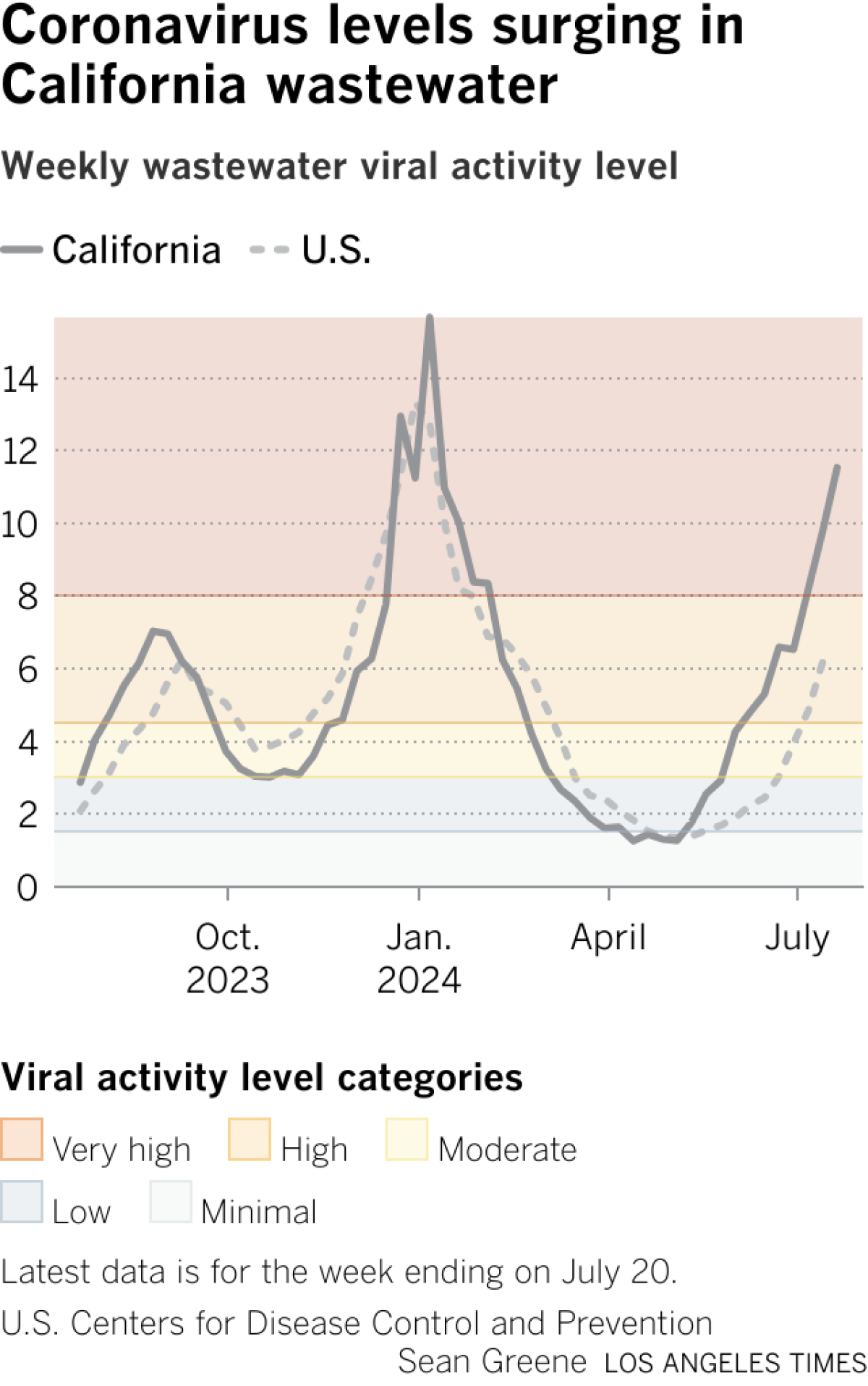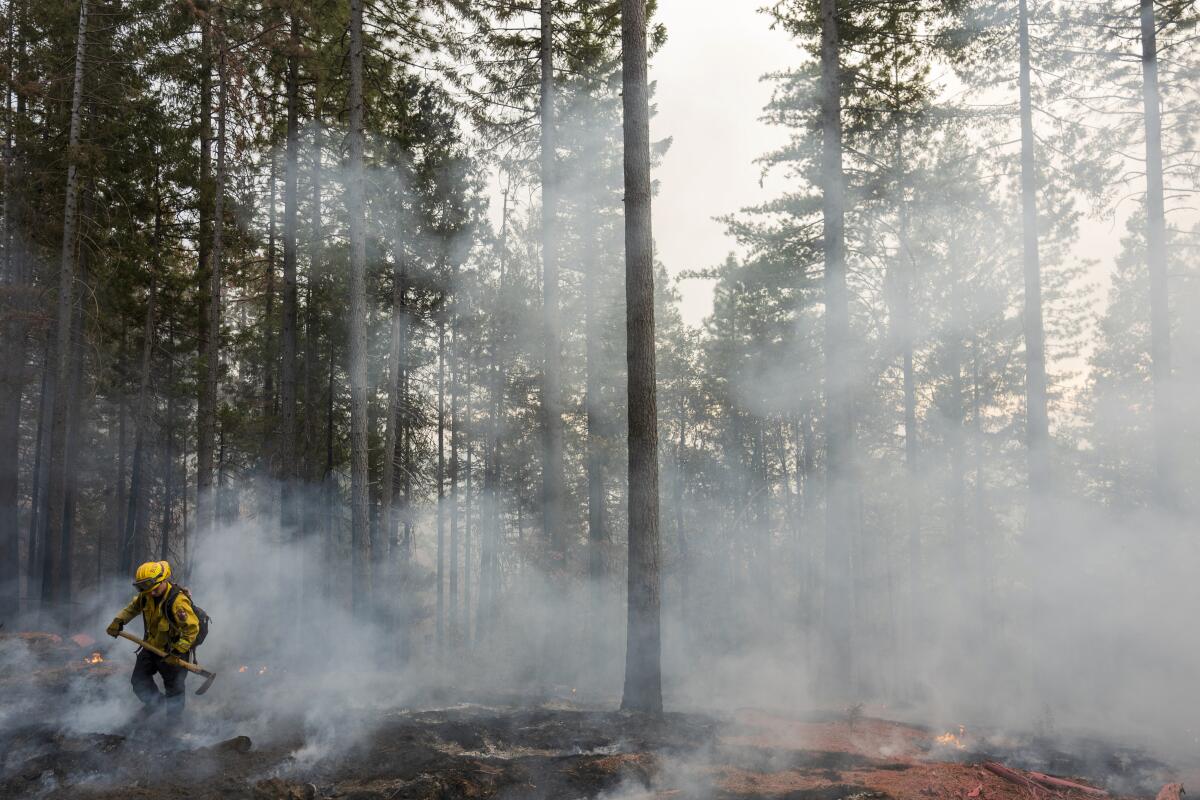Good morning. It’s Monday, July 29. Here’s what you need to know to start your day.
COVID is surging in California. ... Hello?
We interrupt Californian’s fun-filled summer to note once more that COVID is surging in the Golden State — if anyone cares.
It’s hard to tell with all the sold-out concert venues, packed beaches and theme parks, plus record-breaking air travel.
The level of the virus in state wastewater continues to climb, The Times’ Rong-Gong Lin II reports, already exceeding last summer’s increase and nearing the peak in the summer of 2022.
“And there are indications this summer’s COVID wave might have some staying power,” he wrote. “Coronavirus levels in California wastewater have been ‘high’ or ‘very high’ for seven straight weeks, with no sign of cresting.”

Infections are rising as the virus mutates and spreads more easily. The FLiRT subvariants now dominate the U.S. caseload. Hospitalizations have, thankfully, not spiked, and the risk of developing long COVID is lower now than early in the pandemic, according to a recent study, particularly among vaccinated individuals.
Still, the risks remain significant, and health officials continue to urge caution across the board. Dr. Elizabeth Hudson, regional chief of infectious disease at Kaiser Permanente Southern California, offered her perspective to Lin:
“If you have cough-and-cold symptoms, at this point, living in Los Angeles, you should really think that they are COVID until proven otherwise.”
If you’ve been out and about pretty much anywhere, it’s obvious many people didn’t pack that caution for their summer fun.
A Pew Research Center survey conducted in March found that just 20% of U.S. adults consider the coronavirus a major public health threat.
I previously reflected on how I’d let my guard down over time. But we also asked to hear from you, our readers, to learn how your own perceptions and behaviors have changed (or not) five summers into living with COVID.
The hundreds of responses you shared revealed a range of concern, from the extremely cautious to the “not at all” worried.
“It’s mostly an afterthought/inconvenience in my community now,” wrote Joseph S. of Hermosa Beach. “[Like] ‘Oh sorry to hear, get well soon.’ I think the average person in my social group is about the same, with exceptions for people close to older/vulnerable family members.”
Many readers expressed a feeling that nobody around them is taking coronavirus as seriously as they do.
“I don’t shake hands, nor do I go out in public without a mask,” said Stephen B. of San Jose. “People are coughing without covering their mouth or not wearing masks anymore. People just don’t care anymore.”
Some shared that they’d recently contracted COVID or knew someone who had.
For some, that heightened their concerns, while others who experienced mild symptoms said it alleviated their worries.
“It’s a complicated thing because people want things to be how they were pre-pandemic,” Eli L. of Los Angeles shared. “I get that, I want that too!! But the pandemic is ongoing, long COVID is a real threat, and wishing it away isn’t an effective strategy.”
Here’s more of what you shared with us (edited for clarity and brevity).
“A lot of people see me in the mask and roll their eyes. I’ve overheard people joke about how many times they’ve had COVID and either how it was never a big deal or how ‘oh, the first three times I got it were nothing but then the fourth time kicked my butt.’”
— Sarah B., Los Angeles
“The precautions I take are minimal compared to the height of the pandemic. I don’t wear a mask, although I’m always on alert for people who are coughing and sneezing. I do my best to avoid or step away from them. At restaurants or bars, I prefer sitting outside but if inside, I’m mindful of the ventilation system.”
— Bob Z., Davis
“Is COVID on my mind every day? Absolutely not. That would be to live in fear, and not really to live at all. COVID is with us to stay, but it should not destroy everyday living or require divisive mandates. It’s up to individuals, with the tools that have been developed and are available, to manage it for themselves.”
— Andi E., San Diego County
“At first, like most everybody, we took all the precautions like wiping down our groceries when we brought them into the house. Now, I probably wash my hands more.”
— Karen W., Indio
“My workplace has very regular outbreaks and I’m actually grateful that some of my coworkers will test, but not all. But with zero guidelines, it’s not good enough for me so I still wear an N95 at work and at stores. It’s the long COVID and potential brain damage, and well, damage to every organ including the heart that keeps me very concerned.”
— Josh R., West Hollywood
“I’m still very concerned, especially about long COVID. It’s on my mind every week and I still test before and after all business travel and attending conferences (which are frequent for my job), this to ensure that I’m not an asymptomatic carrier.”
— Dawn W., Redlands
“I think people don’t care. They say ‘it’s just like the flu.’ Although when my husband got it this time, people were shocked and asked if he knew how he got it. Of course we don’t know but we alerted everyone who had been near my husband before his positive test. People appreciated that we shared the information.”
— Jill S., Pacific Palisades
“Many immunocompromised people cannot leave their homes because of the lack of restrictions, especially in medical settings. Therefore, I feel it’s important I go out into my community wearing my mask so other people feel okay to wear one too. I have had a positive response to my mask and the precautions I’m taking. I think we need to be kind to each other, so that we can live in a society that is accessible to everyone.”
— Lauren S., Los Angeles
Today’s top stories

Cal Fire firefighter Nick Martinez puts out hot spots from the Park blaze near Forest Ranch on Saturday. (Nic Coury / Associated Press)
The Park fire (and other fires)
More on climate
Politics and power
The Olympics’ California ties
More big stories
No comments:
Post a Comment